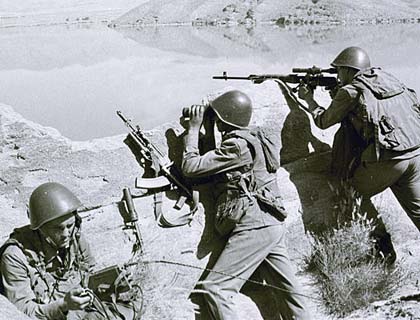This week, Afghans celebrated the 19th anniversary of Mujahedin as they succeeded to force Soviet armies out of Afghanistan on April 28, 1992. But this year, it was not celebrated with enthusiasm as it was being held previously, and the reason is usual which has become like a nightmare for all mass gatherings—Taliban and possible suicidal attacks. But, meanwhile, there allegations from part of Mujahedin claiming that administration deliberately is doing less in order to dishearten people to celebrate the anniversary with lesser enthusiasm.
I am not interested to approve or disapprove the allegations but I am personally in view that the day is increasingly loosing its importance. The word Mujahed is widely present in primary and secondary education textbooks and there is huge admiration for those who actively participated in war against Soviet Union. What I can remember from my childhood, the definition of Mujahed was written like this: "Mujahed is a person who fight (or doing Jihad) in the way of Allah. And followed by some flattering texts about how Mujahedin were brave and courageous that could topple the world's giant military establishment of the time. I even can remember that mass used to say that Mujahedin did not have weapons and formal military training; they could defeat Soviet armies with simple and outdated weapons, because Allah helped them to defeat "infidels".
But this word has lost its significance and does not bear the same importance as it did before. once in Kabul, I was teaching English and called one of student, "oh Mujahed, note down what is written on the board". With using the word I meant nothing, but he complained to director even. Oops! He deemed the word as insult and humiliation, while in similar condition but with different time period, he might thanked me.
It should be noticed that the word Mujahed is still popular among particular spectrum of people and Mujahedin are influential people, having potential of exercising power. Perhaps, the general suspicion foreigners and semi- Afghan xenophobic feeling still play vital role that government keep deep ties with Mujahedin and do not do something which provoke far-reaching anger. Their traditional headquarters strong enough and attempt to marginalize were much successful up to date.
But the prospective of Mujahedin's social standing does not look so convenient. If the complete foreign military withdrawal happens, then there remains nothing to strengthen the so-called revolutionary ideas in the country. Moreover, with the erosion of the concept of colonization and exploitation by foreigner, people who survived and maintain influence with prevalence of such misconception may not last longer.
Here I am not going to appreciate and nor reprimand them for what they had done. Their background is quite clear for sacrifices that made, and, later on, the miseries the brought about for capturing of political power. Was political independence achieved after Soviet military withdrawal? Cautiously, if yes, were they main players of them game or not? And how much the role of Afghan civilians who operated out of Mujahedin dominance was visible? I am not going to answer above the questions and they are left to sound judgment of Afghan civilians themselves.
Here what I am trying to elaborate is that, we once, only for once, live in the same course of history. No body lives in the same period twice. If it was possible, the current world was definitely different. As the history progresses, we strive for something that may not be realized and something opposite may occur. People fought for independence and dignity, but what they achieved was chain and humiliation. The world would not have armed Afghans, if they knew that few years later it changes into a safe-heaven for global terrorism that is parallel dangerous to nuclear weapons.
The above measures held just for dignity and a safe world, but we got was the opposite. Hundreds of thousand of Afghan were killed and millions forlornly have sought refuge to other countries. Humiliation has become part of their live. What left for all we fought are nothing mere miseries, starving stomachs and tearful eyes. I am again emphasizing that we are not living on the same course of history twice, but what we observe is similar to those days. If we cannot change the history, we can try for the future. Our present actions will be followed by results. Which kind of results they will create, it should be noticed now. What we are striving now is democracy; our performance should not be in a manner to yield dictatorship, as occurred during Soviet regime. Soviet armies left, but the far crueler regime, taking direct command from beyond borders captured power.
The international community's military engagement will last, as it is pre-fixed, 14 years. In 2014, there will not remain any foreign military in the country, if every goes on the basis of schedule. Will Afghanistan is destined to go through another of chaos similar to that of happened after Soviet withdrawal? Guessing so is not that hard, unless our intellectuals and politicians consider the broader national interest and leave communal controversies. All in Afghanistan understand that such siding on the basis of communal lines are destructive and not in favor of any one. What we lack is practice, that also among policy makers and planners. What the international can do is not repeating the same mistake as they did after soviet withdrawal. I think for a period, our planners in need of scrutiny by international organization to instantly warn them of communal perversion. Such an effective overseeing can ensure the growth and indigenization of democratic culture and values.

